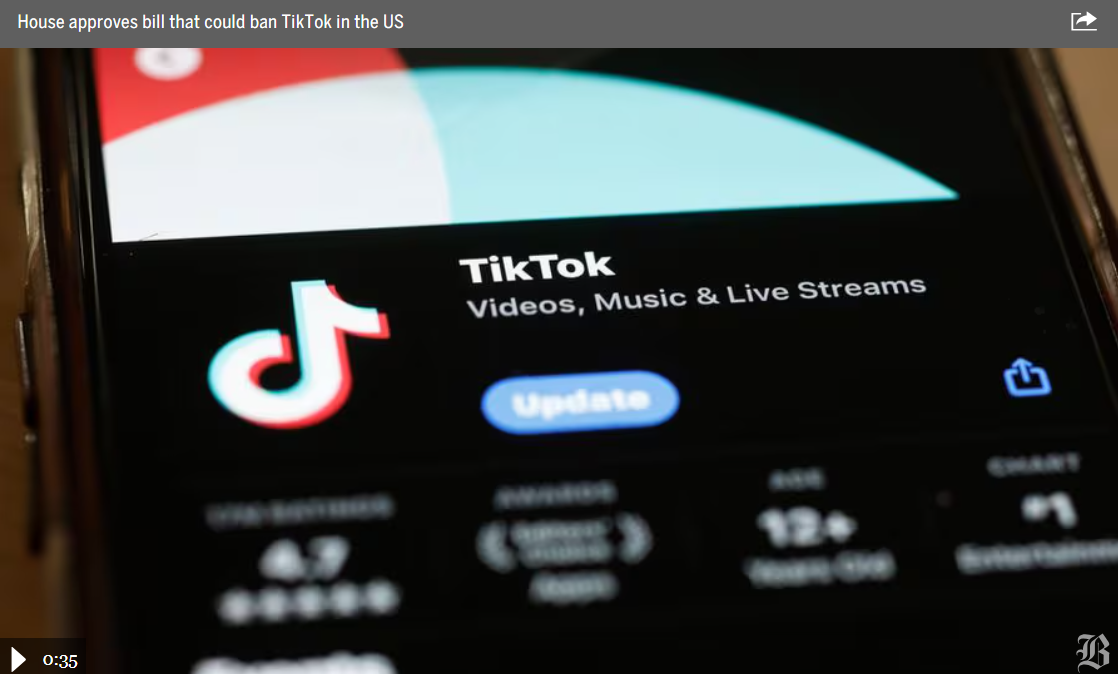众议院通过法案,如果中国所有者不出售,TikTok 将被禁止

【中美创新时报2024年3月13日华盛顿讯】(记者温友平编译)众议院周三(13日)通过了一项法案,如果流行视频应用程序 TikTok 的中国所有者不出售,该法案将在全国范围内禁止该应用程序,因为立法者担心该公司当前的所有权结构对国家安全构成威胁。美联社记者凯文·弗雷金(KEVIN FREKING)对此作了如下详细报道。
该法案以 352 票对 65 票通过,现已提交参议院,但其前景尚不明朗。
TikTok 拥有超过 1.5 亿美国用户,是中国科技公司字节跳动有限公司的全资子公司。
议员们认为,字节跳动受制于中国政府,中国政府可以随时要求获取 TikTok 在美国消费者的数据。这种担忧源于中国的一系列国家安全法,这些法律迫使组织协助情报收集。
“我们给了 TikTok 一个明确的选择,”华盛顿州共和党众议员凯茜·麦克莫里斯·罗杰斯 (Cathy McMorris Rodgers) 表示。 “脱离受制于中国共产党的母公司字节跳动,继续在美国运营,否则就站在中国共产党一边,承担后果。选择是 TikTok 的。”
众议院通过该法案只是第一步。参议院还需要通过这项措施才能成为法律,参议院的立法者表示将对其进行彻底审查。纽约州参议院多数党领袖查克·舒默表示,他必须咨询相关委员会主席来确定该法案的路径。
总统乔·拜登表示,如果国会通过这项措施,他将签署。
众议院投票是中美之间紧张局势加剧的最新例子。通过针对 TikTok,立法者正在应对他们认为对美国国家安全构成严重威胁的问题,但同时也挑出了一个受到数百万人欢迎的平台,其中许多人对 TikTok 存在偏见。更年轻,距离选举只有几个月。
TikTok 发言人亚历克斯·豪雷克 (Alex Haurek) 在投票后的一份声明中表示,该法案是作为秘密程序的一部分而被强行通过的。
豪雷克表示:“我们希望参议院能够考虑事实,听取选民的意见,并认识到这对经济、700 万家小企业以及使用我们服务的 1.7 亿美国人的影响。”
总体而言,197 名共和党议员投票支持该措施,15 名反对。民主党方面,155 票支持该法案,50 票反对。
该法案的一些共和党反对者表示,如果存在数据隐私和宣传方面的担忧,美国应该警告消费者,但最终选择权应该留给消费者。民主党人还警告称,禁令将对美国用户(包括企业家和企业主)产生影响。
加利福尼亚州共和党众议员汤姆·麦克林托克(Tom McClintock)表示:“解决威权主义的办法并不是更加威权主义。” “针对中共式宣传的答案不是中共式镇压。让我们放慢速度,以免跌倒在这个又陡又滑的斜坡上。”
肯塔基州共和党众议员托马斯·马西(Thomas Massie)反对该法案。他表示,美国绝不会支持另一个国家要求美国公司将其出售给另一方,否则将面临禁令。
“我们不会让另一个国家接管福特汽车公司在他们国家销售福特汽车。但这正是我们想要在这里做的,”马西说。 “这是比疾病更糟糕的治疗方法。”
众议院投票前一天,拜登政府高级国家安全官员与议员举行闭门简报会,讨论 TikTok 及其对国家安全的影响。立法者正在平衡这些安全担忧和不限制网上言论自由的愿望。
“我们在这里试图做的是非常深思熟虑地考虑强制剥离 TikTok 的必要性,而不授予行政部门任何监管内容或追查任何美国公司的权力,”众议员迈克·加拉格尔 (Mike Gallagher) 说。比尔的作者从简报会上出来。
TikTok 长期以来一直否认它可以被用作中国政府的工具。该公司表示,从未与中国当局共享美国用户数据,如果被要求也不会这样做。迄今为止,美国政府还没有提供任何证据表明 TikTok 与中国当局分享了此类信息。
该法案上周提出后,共和党领导人迅速采取行动提出。众议院委员会以 50 比 0 的投票结果一致批准了这项立法,尽管他们的办公室被 TikTok 用户要求放弃这项努力的电话淹没了。由于袭击,一些办公室甚至关闭了电话。该法案的支持者表示,这一努力适得其反。
加拉格尔说:“(它)为成员提供了如何将该平台武器化以将虚假信息注入我们系统的预览。”
两党议员都渴望在一系列问题上与中国对抗。众议院成立了一个特别委员会来关注与中国相关的问题。舒默指示委员会主席开始与共和党合作制定两党的中国竞争法案。
舒默可能会感受到来自党内的一些压力,要求推动 TikTok 立法。参议院情报委员会主席马克·沃纳(Mark Warner)在众议院投票后宣布,他将努力“让这项法案在参议院获得通过并签署成为法律”。
沃纳在与情报委员会首席共和党参议员马可·卢比奥(Marco Rubio)的联合声明中表示,“我们对 TikTok 构成的国家安全威胁抱有一致的担忧——这个平台拥有影响和分裂美国人的巨大力量,其母公司 法律仍然要求字节跳动服从中国共产党的命令”
去年一直在推动禁止 TikTok 的密苏里州参议员乔什·霍利 (Josh Hawley) 在投票后在 X 上发帖称:“现在是对 TikTok 采取行动并阻止中国间谍活动的时候了。参议院应立即审议这项法案。”
周三,大约 30 名 TikTok 影响者和其他与他们同行的人在国会山公开反对该法案。他们在投票前高呼“保留 TikTok”等口号。他们还举着标语,上面写着“TikTok 让我的生活变得更好”和“TikTok 帮助我发展了我的业务”。
出席会议的加利福尼亚州萨克拉门托 TikTok 创建者丹·塞林格 (Dan Salinger) 表示,他在 COVID-19 大流行期间开始在该应用程序上创建内容纯粹是出于无聊。但从那时起,他的帐户越来越受欢迎,其中包含有关他的生活和患有痴呆症的父亲的视频。如今,他在该应用程序上拥有 200 万粉丝。
“实际上,出于多种原因,我感到震惊,”塞林格说。 “他们推动这项法案的速度并没有给美国人足够的时间来表达他们的担忧和意见。”
题图:众议院批准可能在美国禁止 TikTok 的法案(波士顿环球报视频报道截屏)。
附英文原文报道:
House passes bill that would lead to TikTok ban if Chinese owner doesn’t sell, but it faces an uncertain path in the Senate
By KEVIN FREKING The Associated Press,Updated March 13, 2024
WASHINGTON (AP) — The House on Wednesday passed a bill that would lead to a nationwide ban of the popular video app TikTok if its China-based owner doesn’t sell, as lawmakers acted on concerns that the company’s current ownership structure is a national security threat.
The bill, passed by a vote of 352-65, now goes to the Senate, where its prospects are unclear.
TikTok, which has more than 150 million American users, is a wholly owned subsidiary of Chinese technology firm ByteDance Ltd.
The lawmakers contend that ByteDance is beholden to the Chinese government, which could demand access to the data of TikTok’s consumers in the U.S. any time it wants. The worry stems from a set of Chinese national security laws that compel organizations to assist with intelligence gathering.
“We have given TikTok a clear choice,” said Rep. Cathy McMorris Rodgers, R-Wash. “Separate from your parent company ByteDance, which is beholden to the CCP (the Chinese Communist Party), and remain operational in the United States, or side with the CCP and face the consequences. The choice is TikTok’s.”
House passage of the bill is only the first step. The Senate would also need to pass the measure for it to become law, and lawmakers in that chamber indicated it would undergo a thorough review. Senate Majority Leader Chuck Schumer, D-N.Y., said he’ll have to consult with relevant committee chairs to determine the bill’s path.
President Joe Biden has said if Congress passes the measure, he will sign it.
The House vote is the latest example of increased tensions between China and the U.S. By targeting TikTok, lawmakers are tackling what they see as a grave threat to America’s national security — but also singling out a platform popular with millions of people, many of whom skew younger, just months before an election.
Alex Haurek, a TikTok spokesperson, said in a statement after the vote that the bill was jammed through as part of a secretive process.
“We are hopeful that the Senate will consider the facts, listen to their constituents, and realize the impact on the economy, 7 million small businesses, and the 170 million Americans who use our service,” Haurek said.
Overall, 197 Republican lawmakers voted for the measure and 15 against. On the Democratic side, 155 voted for the bill and 50 against.
Some Republican opponents of the bill said the U.S. should warn consumers if there are data privacy and propaganda concerns, but the final choice should be left with consumers. Democrats also warned of the impact a ban would have on users in the U.S., including entrepreneurs and business owners.
“The answer to authoritarianism is not more authoritarianism,” said Rep. Tom McClintock, R-Calif. “The answer to CCP-style propaganda is not CCP-style oppression. Let us slow down before we blunder down this very steep and slippery slope.”
Rep. Thomas Massie, R-Ky., opposed the bill. He said the U.S. would never stand for another country demanding that an American company sell to another party or face a ban.
“We wouldn’t let another country take over Ford Motor Co. for selling Ford cars in their country. Yet that’s what we’re wanting to do here,” Massie said. “This is a cure that is worse than the disease.”
The day before the House vote, top national security officials in the Biden administration held a closed-door briefing with lawmakers to discuss TikTok and the national security implications. Lawmakers are balancing those security concerns against a desire not to limit free speech online.
“What we’ve tried to do here is be very thoughtful and deliberate about the need to force a divestiture of TikTok without granting any authority to the executive branch to regulate content or go after any American company,” said Rep. Mike Gallagher, the bill’s author, as he emerged from the briefing.
TikTok has long denied that it could be used as a tool of the Chinese government. The company has said it has never shared U.S. user data with Chinese authorities and won’t do so if it is asked. To date, the U.S. government also has not provided any evidence that shows TikTok shared such information with Chinese authorities.
Republican leaders moved quickly to bring up the bill after its introduction last week. A House committee approved the legislation unanimously, on a 50-0 vote, even after their offices were inundated with calls from TikTok users demanding they drop the effort. Some offices even shut off their phones because of the onslaught. Supporters of the bill said the effort backfired.
“(It) provided members a preview of how the platform could be weaponized to inject disinformation into our system,” Gallagher said.
Lawmakers in both parties are anxious to confront China on a range of issues. The House formed a special committee to focus on China-related issues. And Schumer directed committee chairs to begin working with Republicans on a bipartisan China competition bill.
Schumer is likely to feel some pressure from within his own party to move on the TikTok legislation. Senate Intelligence Committee Chairman Mark Warner announced after the House vote that he will work to “get this bill passed through the Senate and signed into law.”
In a joint statement with Sen. Marco Rubio, the top Republican on the Intelligence panel, Warner said that “we are united in our concern about the national security threat posed by TikTok – a platform with enormous power to influence and divide Americans whose parent company ByteDance remains legally required to do the bidding of the Chinese Communist Party”
Missouri Sen. Josh Hawley, who has been pushing to ban TikTok for the last year, posted on X after the vote: “NOW is the time to act on TikTok and stop China spying. The Senate should take up this bill immediately.”
Roughly 30 TikTok influencers and others who traveled with them spoke out against the bill on Capitol Hill on Wednesday. They chanted phrases like “Keep TikTok” ahead of the vote. They also held signs that read “TikTok changed my life for the better” and “TikTok helped me grow my business.”
Dan Salinger, a Sacramento, California-based TikTok creator in attendance, said he started creating content on the app during the COVID-19 pandemic purely out of boredom. But since then his account, which features videos about his life and his father, who suffers from dementia, has grown in popularity. Today, he has 2 million followers on the app.
“I’m actually appalled for many reasons,” Salinger said. “The speed with which they’re pushing this bill through does not give enough time for Americans to voice their concerns and opinions.”

